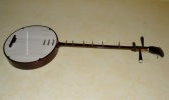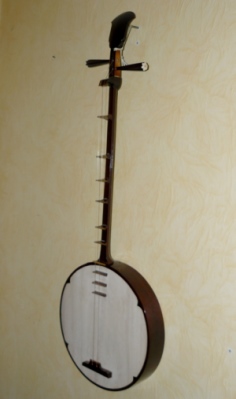|
This
two-stringed long neck lute is namend after its moonshaped resonating
box and belongs to the classical accompanying instruments in
Vietnam, mostly used for singing traditions like the ca Hue and hat Van.
The
Nguyet
is remarkable for its wide,
outstanding frets which remind us of equal sized frets of the Japanese
Biwa
lute.
These
frets allow the player a wide range for ornamenting and
manipulating the plucked notes. One should also keep in mind that some
Vietnamese scales require a change of the pitch, mostly in a
range
of a quarter tone, so Western users might wonder about the "wrong"
placement of the frets...
The Nguyet
is tuned in a perfect fifth or fourth, depending on which piece gets
performed and which mode/scale is required.
The player
plucks the chords with his fingernails or a plectrum, and sometimes the
lower chord functions as a drone.
Improvisations
are common, this instrument also often gets used for students of the
traditional music, as it preserves a good example of the possible
Vietnamese scales.
Several
composers started writing new solo pieces for the Nguyet, taking it
for
the new "classical guitar" of Vietnam.
|





